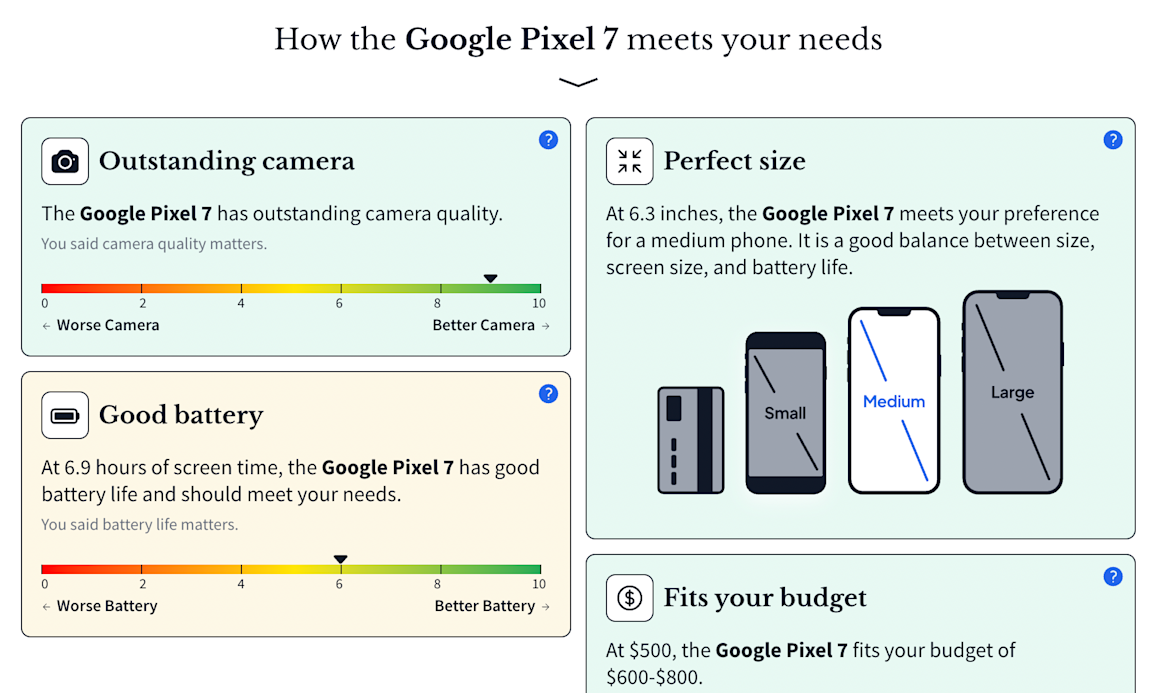What happened to the Wirecutter (and how we're fixing online recommendations)


The Atlantic recently published a piece by Charlie Warzel looking at what happened to the Wirecutter and why lots of people are convinced its recommendations are going downhill. It’s a good overview of some of the big challenges faced by the once-beloved recommendation site and how the business has changed since it was purchased by The New York Times in 2016.
Warzel ultimately concludes that the deterioration in quality isn’t entirely the New York Times’ fault because making the kind of personalized recommendations consumers increasingly demand is really hard due to the number of products and preferences, and the rise of video has changed the internet, leaving users less willing to read 7,500 words just to buy a cell phone.
But solving the personalization problem is possible. So is reducing information overload. They just aren’t solvable with long-form articles by professional writers. You need a different approach. Here’s how we’re fixing product recommendations at PerfectRec.
The Best-For-Most-People Problem
Warzel says the personalization problem is one that haunts Wirecutter staff. Readers are increasingly aware that the best gadget for one person may not be the best for another, depending on their life situation. Wrestling with how to answer what’s best for “most people” has become a “herculean task” and Warzel reports that the Wirecutter is undergoing a review of whether or not long articles are the best way to grapple with the problem.
How We're Solving The Best-For-Most-People Problem at PerfectRec
PerfectRec is solving the personalization problem head on: by asking straightforward questions. We don’t need to guess what “most people” want when recommending a product because we ask you what you’re looking for in simple, jargon-free language. With each multiple choice question you answer, we update your recommendations in real time and at the end of the brief questionnaire, we provide you with a personalized overview explaining our recommendations and showing how they compare to alternatives.
The key to making this useful, though, is that we aren’t just filtering products. We are using your answers to inform our machine learning model. We don’t take your preferences as hard constraints, but rather as guidelines to find you the perfect product. And if you have conflicting preferences – say for a small phone with great battery life (which doesn’t exist) – we will tell you and suggest alternatives.
The Information Overload Problem
Wirecutter articles are long. A sampling of the buying guides featured on their homepage today included 4,950 words on mens underwear, 5,952 words on women’s razors, and 4,250 words on laptops (not including pro models or their student guide). For an average reader, those guides would take 38 minutes, 45 minutes and 32 minutes respectively to read. While very long guides can allow Wirecutter writers to partially address the “most people” problem by covering a range of scenarios, it also results in information overload. Few people want to spend over an hour reading the Wirecutter’s 22,000 words on air purifiers, most of which don’t fit your needs.
How We're Solving the Information Overload Problem at PerfectRec

Instead of hitting users with a wall of text, we’ve designed our site to be interactive. You answer multiple-choice questions. We provide personalized recommendations and generate a dynamic explanation with text and rich visuals to help you understand your recommendation and see how it compares to other options. It’s not a long-form essay, but it solves the problem of information overload and short attention spans.
The Recommendation Quality Problem
Warzel doesn’t seem to entirely agree with Reddit and Twitter users who think Wirecutter recommendations have gotten worse, but we do. Twitter is full of stories about Wirecutter recommendation fails. The reason behind this is likely structural. As Warzel goes over in his piece, management put a lot of pressure on the Wirecutter to increase output following the acquisition. They changed the pay structure for contract reviewers from hourly to a per-piece rate, and increasingly relied on staff writers for their reviews. The problem is giving good recommendations on a wide range of products requires expertise in a wide range of products. Even if they have category knowledge, the Wirecutter’s staff writers are unlikely to have thousands of hours of expertise in everyone of product lines they are expected to cover, and the contract reviewers who have this level of intensive expertise aren’t going to invest as much time if you’re not paying them to do so.
How We're Solving the Recommendation Quality Problem at PerfectRec
You can’t make high quality recommendations unless you have the hyper expertise to do so. We’re solving the recommendation quality problem by going deep on the most important product lines and investing in hiring the experts we need to do so. We scour the internet for the true product obsessives–people who’ve spent thousands of hours following the latest developments for their favorite gadgets–and hire them to work on our recommendation engines. The experts identify and review the relevant products and then work with our data science team to help train and fine tune our recommendation model. While the Wirecutter has to hire for writing ability, we can focus solely on deep product knowledge. The result is higher quality recommendations that won’t leave The Atlantic asking what went wrong.
Stay up to date on new products
Get occasional updates about new product releases, interesting product news, and exciting PerfectRec features. No spam. We never share your email.
